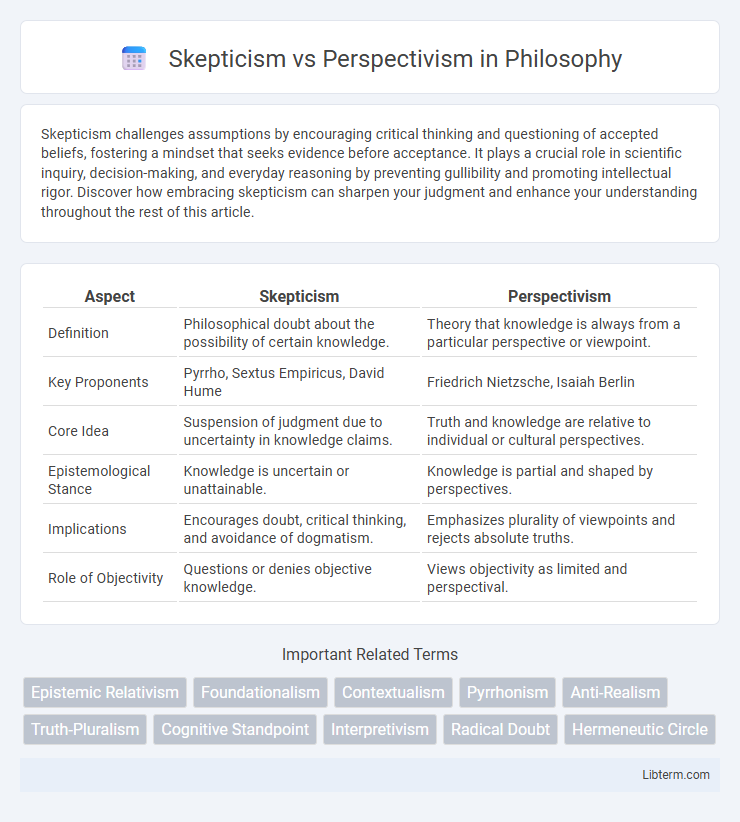Skepticism challenges assumptions by encouraging critical thinking and questioning of accepted beliefs, fostering a mindset that seeks evidence before acceptance. It plays a crucial role in scientific inquiry, decision-making, and everyday reasoning by preventing gullibility and promoting intellectual rigor. Discover how embracing skepticism can sharpen your judgment and enhance your understanding throughout the rest of this article.
Table of Comparison
| Aspect | Skepticism | Perspectivism |
|---|---|---|
| Definition | Philosophical doubt about the possibility of certain knowledge. | Theory that knowledge is always from a particular perspective or viewpoint. |
| Key Proponents | Pyrrho, Sextus Empiricus, David Hume | Friedrich Nietzsche, Isaiah Berlin |
| Core Idea | Suspension of judgment due to uncertainty in knowledge claims. | Truth and knowledge are relative to individual or cultural perspectives. |
| Epistemological Stance | Knowledge is uncertain or unattainable. | Knowledge is partial and shaped by perspectives. |
| Implications | Encourages doubt, critical thinking, and avoidance of dogmatism. | Emphasizes plurality of viewpoints and rejects absolute truths. |
| Role of Objectivity | Questions or denies objective knowledge. | Views objectivity as limited and perspectival. |
Introduction to Skepticism and Perspectivism
Skepticism challenges the certainty of knowledge by doubting the possibility of absolute truth, emphasizing continuous questioning and critical inquiry. Perspectivism asserts that knowledge and truth are always interpreted through individual perspectives shaped by cultural, historical, or personal contexts, rejecting objective universality. Both philosophical approaches highlight the limitations of human cognition but differ in their treatment of truth's existence and accessibility.
Historical Origins and Key Philosophers
Skepticism originated in ancient Greece with Pyrrho of Elis, who questioned the possibility of certain knowledge, influencing later thinkers like Sextus Empiricus who systematically documented skeptical philosophy. Perspectivism emerged primarily through Friedrich Nietzsche in the 19th century, emphasizing the subjective nature of interpretation and rejecting absolute truths in favor of multiple viewpoints. Both philosophies challenge objective knowledge but differ in approach: skepticism promotes doubt and suspension of judgment, while perspectivism advocates for the validity of diverse perspectives shaped by individual experiences.
Defining Skepticism: Core Principles
Skepticism centers on doubting or questioning the possibility of certain knowledge or truth, emphasizing critical inquiry and the suspension of judgment. Core principles include the assertion that human senses and reasoning are fallible, leading to the conclusion that absolute certainty is often unattainable. This philosophical stance challenges assumptions by demanding rigorous evidence before accepting any claim as knowledge.
Understanding Perspectivism: Main Concepts
Perspectivism emphasizes that knowledge and truth are always influenced by specific viewpoints, rejecting absolute objectivity. It posits that every perception or interpretation is shaped by cultural, historical, and individual factors, making all truths context-dependent. This contrasts with skepticism, which doubts the possibility of certain knowledge, while perspectivism accepts multiplicity of truths based on diverse perspectives.
Methodologies: How Each Approach Handles Knowledge
Skepticism employs rigorous questioning and systematic doubt to challenge the certainty of knowledge claims, emphasizing the limitations of human cognition and the need for evidence before acceptance. Perspectivism recognizes multiple viewpoints as inherently shaping knowledge, using relativistic analysis to understand how context, culture, and individual perspectives influence interpretation. While skepticism seeks to suspend judgment pending proof, perspectivism embraces the coexistence of diverse truths grounded in varying subjective frameworks.
Objectivity versus Subjectivity
Skepticism challenges the possibility of absolute objectivity by questioning the certainty of knowledge, emphasizing doubt and critical inquiry. Perspectivism asserts that all knowledge is inherently subjective, shaped by individual perspectives and contexts rather than universal truths. This contrast underlines the tension between seeking objective facts and acknowledging the influence of subjective experience in understanding reality.
Major Arguments for Skepticism
Major arguments for skepticism emphasize the inherent limitations of human knowledge, arguing that sensory perceptions and cognitive processes are prone to error and misinterpretation. Skeptics highlight the absence of infallible criteria for truth, suggesting that certainty is unattainable in both empirical and rational domains. This viewpoint challenges claims of absolute knowledge by insisting on continuous questioning and withholding assent in the face of doubt.
Major Arguments for Perspectivism
Perspectivism argues that knowledge and truth are always shaped by individual or cultural perspectives, emphasizing the interpretative nature of experience and rejecting absolute objectivity. Major arguments for Perspectivism include the philosophical insights of Friedrich Nietzsche, who posited that all truths are contingent upon human perspectives, and the recognition of cognitive limitations that prevent access to a singular, universal truth. This view challenges Skepticism by asserting that while certainty may be unattainable, understanding can be enriched through multiple, context-bound viewpoints rather than suspended judgment.
Practical Implications in Modern Philosophy
Skepticism challenges the certainty of knowledge by questioning the possibility of absolute truth, leading to a cautious approach in modern philosophical inquiry and decision-making. Perspectivism emphasizes the diversity of viewpoints, fostering a pluralistic understanding that recognizes knowledge as context-dependent and shaped by individual perspectives. These frameworks influence contemporary debates on epistemology, ethics, and science by promoting critical reflection and adaptive reasoning in addressing complex, real-world problems.
Conclusion: Synthesizing Skepticism and Perspectivism
Synthesizing skepticism and perspectivism reveals a nuanced approach to knowledge that embraces doubt while acknowledging multiple viewpoints as valid. This integration promotes intellectual humility by recognizing the limits of certainty and encouraging the evaluation of diverse perspectives. The combined framework fosters a dynamic understanding where knowledge is provisional and context-dependent, enhancing critical thinking and openness to alternative interpretations.
Skepticism Infographic

 libterm.com
libterm.com